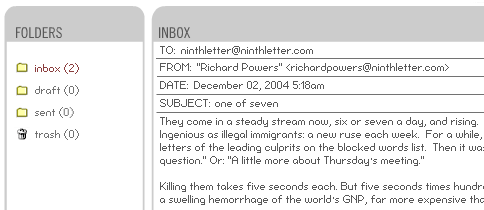Donna Leishman’s Possession
As Jill pointed out not too long ago, Donna Leishman recently completed a practice-based PhD program, developing The Possession of Christian Shaw as part of that work. Her dissertation, “Creating Screen-Based Multiple State Environments: Investigating Systems of Confutation,” is now online, too. Visually, interactively, and in terms of its relationship to a grim tale, her new artwork shares some some of the features of Donna’s earlier The Bloody Chamber and Red Riding Hood, building upon the idiom of those pieces in strange and elaborate ways. In a change from the previous peices, the grim tale of Possession is not from a fabular tradition, as will be explained at the end to the assiduous interactor.

 A Review of
A Review of 


 We’re gutted, and we may never again check the price tag on a GameCube. Jeff Minter’s spectacular and innovative project
We’re gutted, and we may never again check the price tag on a GameCube. Jeff Minter’s spectacular and innovative project 